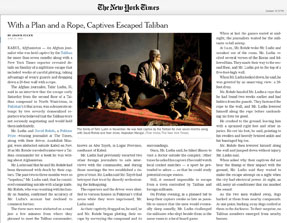| On June 20, the New York Times disclosed the dramatic escape by its reporter David Rohde and his Afghan translator Tahir Ludin from Taliban captivity. It was the first time the public got wind of the kidnapping, which occurred on Nov. 10 while Rohde was on his way to interview a Taliban commander outside Kabul.
Remarkably, the Times conspired with scores of other news organizations that knew about the kidnappings on a news blackout for seven months while the newspaper and the U.S. government worked on their release, apparently out of fear that the publicity might jeopardize their safety. Even after the escape, the Times remains coy about disclosing details of the news blackout and its secret efforts to secure the journalists’ release. It insists it did not pay any ransom, but hasn’t refuted rumors that it considered a $5 million demand. Times executive editor Bill Keller told The News Hour: “What I can tell you or what I’m willing to tell you, honestly, is very little. I mean, we’ve just made a decision that talking about who did what, who decided what, who advised what during this time simply contributes to the playbook of kidnappers.”
That is an extraordinary admission from America’s preeminent news organization, one that has gone to extraordinary lengths to resist governmental censorship, such as in the most celebrated Supreme Court case on the subject in 1971, over the publication of the Pentagon Papers, a secret report on the history of U.S. military involvement in Vietnam. Over the decades, the newspaper has repeatedly resisted censorship attempts, including, most recently, by the Bush administration to hide details about prisoner abuses and eavesdropping on American citizens. In every instance, the principal governmental justification is precisely the one advanced by the Times, namely that the disclosure would be calamitous to public safety. The argument has been historically refuted every time, without exception. The country survived not just the publication of the Pentagon Papers and the torture memos, but even perhaps the riskiest information of all — the 1979 disclosure of details about the hydrogen bomb, which, the government warned, was a lethal cookbook for America’s enemies. The Times self-serving claims are equally specious; surely the risks to a private journalist pale before the dangers to national security and a nuclear holocaust. What is even more distressing is that so many major news organization, not just in the U.S., but even internationally, so readily consented to the news blackout, because it involved one of their own, a consideration they would blithely deny anyone else. No less disheartening is the media’s muted reaction to, and even condoning of, the newspaper’s unethical and duplicitous conduct. Wrote Sioux City Journal editor Mitch Pugh: “I don’t see a debate here…. Protecting the life of this reporter and his assistant seems to outweigh any value in reporting fully and accurately.” Really? That must be the new creed of the Gray Lady, which for well over a century has trumpeted the motto, “All the news that’s fit to print.” |
Unfit To Print

